|
1. Couric Portrays Plame as Heroic Victim of White House 'Smear'
Katie Couric's Sunday 60 Minutes interview, to promote Valerie Plame's new book, Fair Game: My Life as a Spy, My Betrayal by the White House, framed the story just as the media have all along -- Painting Plame as a heroic victim of an orchestrated "smear" with little consideration to who actually gave her name to Bob Novak or the responsibility and motivation of her husband who picked a high-profile political fight with the White House. Couric went so far as to suggest President Bush's personal involvement in the "smear" effort: "When all is said and sone, the top aides to the President and Vice President leaked your name to reporters, do you think President Bush was in on this?" In a preview on Friday's Early Show, Harry Smith asserted Plame's "life story reads like a spy novel," gushing that "she is beautiful, smart, a covert agent." In a preview on Friday's Early Show, Couric told Smith that Plame is "very charming, incredibly intelligent and eloquent and really mad about what happened to her, angry and resentful of being outed, if you will, having her career end this way." On Friday's Evening News, Couric reported that "when senior administration officials leaked her name to reporters, they may have exposed other spies and damaged operations targeting Iran."
2. ABC's Stossel Takes on Gore Movie, Talks to Dissenting Scientists
On Friday's 20/20, ABC's John Stossel presented the views of scientists who dissent from the Al Gore view of global warming, including two former members of the IPCC -- the committee which shared the Nobel Peace Prize with Gore. These scientists disagreed with the selection process of the committee's members and some of its conclusions. The ABC host disputed some of the claims in An Inconvenient Truth, and even presented the view that increased carbon dioxide levels are the result of global warming, rather than the cause, as he took on Gore's famous graph from the movie: "But the real inconvenient truth is that carbon increases came after temperature rose -- usually hundreds of years later. Temperature went up first. I wanted to ask Mr. Gore about that and other things, but he wouldn't agree to talk about this."
3. CNN's O'Brien Talks to Gore Critic, Hints Doubters 'In the Dark'
On Friday night, CNN viewers were treated to the special "Keeping Them Honest: The Truth About Global Warming," which took time to examine nine "alleged inconsistencies or exaggerations" in Al Gore's An Inconvenient Truth, as enumerated in a ruling by a British judge. Host Miles O'Brien also interviewed a member of the IPCC, the group which shared the Nobel Peace Prize with Gore, in the form of a scientist who has challenged Gore's views on global warming. O'Brien, who a week earlier had tagged dissenters with such labels as "dead-enders" and "a very small fringe," on this show suggested that people who are "skeptical" about global warming are "in the dark," and presented what he called "surprising" polling data showing a substantial number of Americans have doubts about global warming theory. Notably, beginning at 1:00 p.m. earlier in the day, CNN started displaying its logo in green, and, for a while, used a clock counting down how long it will be until the upcoming series "Planet in Peril" begins on Tuesday.
4. 11-Year-Old Kid on CBS Reality Show: Bush 'Not Smart at All'
No where on CBS is a safe zone from some gratuitous Bush-bashing, not even the Kid Nation reality show, the MRC's Kristine Lawrence noticed. For last Wednesday's episode of the show premised on kids establishing and running a community at a New Mexico ghost town, dubbed "Bonanza City," four sets of kids had to assemble in chronological order photographs of seven U.S. Presidents. The yellow team won, mainly because of team member Zach, ten-year-old. His fellow teammate, 11-year-old-Kelsey from Pennsylvania, seemed to resent his success as the program featured this comment from her: "We won with the help of Zach, but just because he knows his Presidents doesn't mean he's the best leader. I mean, look at George W. Bush. He's not smart at all but he won the U.S. President two times in a row."
5. Late Show Contest's 'Top Ten Cool Things About Global Warming'
Late Show's "Top Ten Contest" winning entries for the "Top Ten Cool Things About Global Warming."
 Couric Portrays Plame as Heroic Victim Couric Portrays Plame as Heroic Victim
of White House 'Smear'
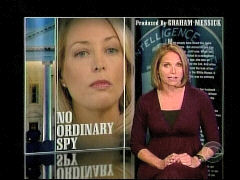 Katie Couric's Sunday 60 Minutes interview, to promote Valerie Plame's new book, Fair Game: My Life as a Spy, My Betrayal by the White House, framed the story just as the media have all along -- Painting Plame as a heroic victim of an orchestrated "smear" with little consideration to who actually gave her name to Bob Novak or the responsibility and motivation of her husband who picked a high-profile political fight with the White House. In a preview on Friday's Early Show, Harry Smith asserted Plame's "life story reads like a spy novel," gushing that "she is beautiful, smart, a covert agent." Smith recalled how "Robert Novak revealed her identify as an undercover CIA agent in his syndicated column" and that "speculation was rampant that the leaking of her name, which is a crime, came from inside the Bush administration, in retaliation for her husband's column." Whether it is a "crime" is far from settled, but without ever pointing out how Novak got the name from Deputy Secretary of State Richard Armitage, a political enemy of Dick Cheney and Karl Rove who opposed the Iraq war, Smith noted that "no one was ever charged with knowingly leaking Valerie Plame's name."
Katie Couric's Sunday 60 Minutes interview, to promote Valerie Plame's new book, Fair Game: My Life as a Spy, My Betrayal by the White House, framed the story just as the media have all along -- Painting Plame as a heroic victim of an orchestrated "smear" with little consideration to who actually gave her name to Bob Novak or the responsibility and motivation of her husband who picked a high-profile political fight with the White House. In a preview on Friday's Early Show, Harry Smith asserted Plame's "life story reads like a spy novel," gushing that "she is beautiful, smart, a covert agent." Smith recalled how "Robert Novak revealed her identify as an undercover CIA agent in his syndicated column" and that "speculation was rampant that the leaking of her name, which is a crime, came from inside the Bush administration, in retaliation for her husband's column." Whether it is a "crime" is far from settled, but without ever pointing out how Novak got the name from Deputy Secretary of State Richard Armitage, a political enemy of Dick Cheney and Karl Rove who opposed the Iraq war, Smith noted that "no one was ever charged with knowingly leaking Valerie Plame's name."
Couric told Smith that Plame is "very charming, incredibly intelligent and eloquent and really mad about what happened to her, angry and resentful of being outed, if you will, having her career end this way." On Friday's Evening News, Couric avoided Armitage's name as she reported that "when senior administration officials leaked her name to reporters, they may have exposed other spies and damaged operations targeting Iran." Couric soon relayed Plame's contention that "that the leak of her name had serious repercussions." In a likely understatement, Couric ended her preview by highlighting how "Valerie Plame Wilson also has some harsh things to say about President Bush."
In the 60 Minutes piece which aired, Couric went so far as to suggest President Bush's personal involvement in the "smear" effort: "When all is said and
done, the top aides to the President and Vice President leaked your name to reporters, do you think President Bush was in on this?" Plame replied: "I don't know about that. But I, like most other Americans, saw President Bush say on TV that he would fire anyone from his administration found to be involved in leaking my name. It turns out the President is not a man of his word."
In the closest either preview came to casting any doubt on Plame's viewpoint, Smith raised "these allegations that came out after the fact, people in Washington, these insiders say everybody knew she was in the CIA, everybody knew that she was a covert op. She wasn't outed at all." Couric countered: "She would contend that this was part of a smear campaign against her..."
Neither preview raised anything about the political motives of her husband, Joe Wilson, who advised the Kerry campaign in 2004, or his culpability for penning an op-ed in the New York Times and then accepting an invitation to go on Meet the Press -- a high media profile he and his wife must have realized would bring scrutiny as to who suggested or directed the former ambassador to travel to Niger.
[This item, updated with what aired Sunday night, is based on a Friday night posting on the MRC's blog, NewsBusters.org: newsbusters.org ]
In the actual October 21 60 Minutes story, Couric did mention Armitage, but failed to note he was Novak's source, preferring to spin a larger conspiracy and allow Joe Wilson to accuse the Bush team of "Mafia-like" tactics:
COURIC: The special prosecutor, Patrick Fitzgerald, found evidence there were four leakers: Deputy Secretary of State Richard Armitage, the Vice President's Chief of Staff, Lewis "Scooter" Libby, President Bush's closest confidante, Karl Rove, and White House spokesman Ari Fleischer. All avoided the most serious charges by claiming not to know she was undercover. But Joe Wilson says that's no excuse.
JOE WILSON: It was a mafia-like tactic. And the idea of going after your family, even in Washington, was an outrage. Nobody went after Karl Rove's family. Nobody went after Scooter Libby's family. They went after my family.
The 60 Minutes piece, however, did include a mild challenge to Plame for enjoying some limelight as Couric also noted the "partisan" take of the couple:
COURIC: It was so serious, the President promised to fire anyone involved in revealing her identity to the press.
PRESIDENT BUSH: If somebody did leak classified information, I'd like to know it, and we'll take the appropriate action.
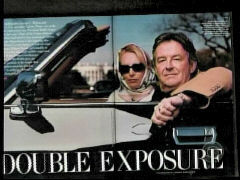 COURIC: An investigation was launched. But as it dragged on, the Wilsons hardly kept a low profile, appearing at glamorous public events, political fundraisers for the Democratic party, and in Vanity Fair magazine. COURIC: An investigation was launched. But as it dragged on, the Wilsons hardly kept a low profile, appearing at glamorous public events, political fundraisers for the Democratic party, and in Vanity Fair magazine.
COURIC: You know, you're a covert CIA agent for X number of years and suddenly, you know, you're in this Greta Garbo pose in your husband's Jaguar.
PLAME: It was more trouble than it was worth. And it was, I was not interviewed for the article. I was not identifiable. The damage had already been done.
COURIC: Do you regret the photo?
PLAME: You have my answer.
COURIC: How did you boss react, Valerie, to that photograph?
PLAME: Poorly, as he had every right to do so. He was caught unawares. And he gave me a really good chewing out. As I deserved to be.
COURIC: Can you understand how people just were turned off by that whole thing? They felt, "Gee maybe she's enjoying her celebrity a little too much"?
PLAME: Well, again, you have to ask "Who are these people and what is their agenda?" "Why are they asking that?"
COURIC: What about those who think you and Joe have become too partisan?
PLAME: Again, that's how it's how the right has chosen to frame us.
COURIC: You have become very partisan though. Would you agree with that?
PLAME: After what we've been through and how I've seen this administration react, not just on this issue, but on others, yes.
Back in March, one media outlet delivered a contrarian take not explored by Couric on Sunday night. An excerpt from a March 8 CyberAlert item, "Washington Post's Contrarian Editorial: Wilson 'a Blowhard'"
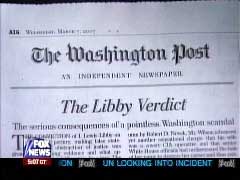 A Wednesday [March 7] Washington Post editorial, "The Libby Verdict: The serious consequences of a pointless Washington scandal," certainly didn't match the angle of the rest of the media's coverage of the Libby conviction. Far from treating Joe Wilson as a truth-telling hero, the March 7 Washington Post editorial declared: "Mr. Wilson's case has besmirched nearly everyone it touched. The former ambassador will be remembered as a blowhard." The Post castigated Libby for "lying under oath," yet explained that while "Wilson was embraced by many because he was early in publicly charging that the Bush administration had 'twisted,' if not invented, facts in making the case for war against Iraq....a bipartisan investigation by the Senate intelligence committee subsequently established that all of these claims were false -- and that Mr. Wilson was recommended for the Niger trip by Ms. Plame, his wife." A Wednesday [March 7] Washington Post editorial, "The Libby Verdict: The serious consequences of a pointless Washington scandal," certainly didn't match the angle of the rest of the media's coverage of the Libby conviction. Far from treating Joe Wilson as a truth-telling hero, the March 7 Washington Post editorial declared: "Mr. Wilson's case has besmirched nearly everyone it touched. The former ambassador will be remembered as a blowhard." The Post castigated Libby for "lying under oath," yet explained that while "Wilson was embraced by many because he was early in publicly charging that the Bush administration had 'twisted,' if not invented, facts in making the case for war against Iraq....a bipartisan investigation by the Senate intelligence committee subsequently established that all of these claims were false -- and that Mr. Wilson was recommended for the Niger trip by Ms. Plame, his wife."
For the March 8 CyberAlert posting in full: www.mediaresearch.org
A rough transcript of the 60 Minutes story as posted by CBSNews.com: www.cbsnews.com
The MRC's Kyle Drennen corrected the closed-captioning against the video to create this transcript of Couric's pre-taped session with Harry Smith aired during the 7:30am half hour of the October 19 Early Show:
SMITH: Valerie Plame spent nearly 20 years in the shadows of the CIA. Then suddenly, she became a public figure. But she's never told her own story -- until now. Her life story reads like a spy novel. She is beautiful, smart, a covert agent. She became the center of a political scandal when her husband, career diplomat Joe Wilson, wrote an op-ed in the New York Times claiming the Bush administration distorted intelligence about Iraq's efforts to obtain uranium in Africa. Eight days later, Robert Novak revealed her identify as an undercover CIA agent in his syndicated column. Speculation was rampant that the leaking of her name, which is a crime, came from inside the Bush administration, in retaliation for her husband's column. The leak grew into a scandal that embroiled the political elite in Washington. And journalists who spent their careers protecting the identity of their sources were faced with a choice of naming names or going to jail. When it was all over, Vice President Cheney's Chief of Staff, Lewis "Scooter" Libby, was charged and convicted of lying to investigators and obstruction of justice. President Bush later commuted his sentence. No one was ever charged with knowingly leaking Valerie Plame's name. Valerie Plame gave her first-ever interview to CBS Evening News anchor and 60 Minutes correspondent Katie Couric. I spoke to Katie earlier about it.
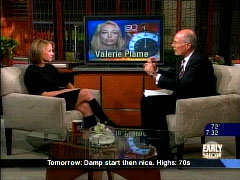 SMITH TO COURIC: This interview, everybody in the world has wanted this interview. This is the interview. First off, what was she like? SMITH TO COURIC: This interview, everybody in the world has wanted this interview. This is the interview. First off, what was she like?
KATIE COURIC: She's very charming, incredibly intelligent and eloquent-
SMITH: Hmm.
COURIC: -and really mad about what happened to her, angry and resentful of being outed, if you will, having her career end this way. And she expresses it, you know, pretty openly.
SMITH: Yeah. In the interview and in the book.
COURIC: Yes.
SMITH: Here's what I want to know -- her husband writes, Joe Wilson, writes this op-ed piece for the New York Times basically saying the Bush administration got it all wrong, cooked the books on this uranium going into Niger.
COURIC: Right.
SMITH: And he writes this piece. Is she -- what is she thinking?
COURIC: Well, she knew about it. She knew he was going to submit it to the New York Times. She knew that he had gone to Niger and found that the charges that Iraq was buying uranium ore from Niger were false, in his opinion and I asked her that, Harry, because I said weren't you afraid your two worlds were going to collide, that this was going to really put you in jeopardy? And she said absolutely not. I have lived my cover. I was living my cover. Nobody knew I worked for the CIA except an extremely small circle of people, i.e., I believe her parents and the people with whom she worked.
SMITH: Yeah. What about the allegation, though? Because there were all these allegations that came out after the fact, people in Washington, these insiders say everybody knew she was in the CIA, everybody knew that she was a covert op. She wasn't outed at all.
COURIC: She would contend that this was part of a smear campaign against her, that by minimizing her role at the CIA, by diminishing and, quite frankly, by demeaning her position, which was quite high, she was head of operations for the joint task force Iraq, which was charged with finding nuclear weapons. So, I think that she would just refute that whole notion that everybody knew this was the case.
SMITH: Yeah. I want to take a look at another clip of the interview. Take a look at this.
COURIC, in 60 MINUTES STORY: Eight days after Joe Wilson's op-ed piece, his wife's name and CIA affiliation were printed in a newspaper by conservative columnist Robert Novak. 18 years of meticulously crafted cover were gone in an instant.
VALERIE PLAME: I can tell you all the intelligence services in the world that morning were running my name through their databases to see did anyone by this name come in the country, when, do we know anything about it, where did she stay, who did she see.
COURIC: And what would be the ramifications of that?
PLAME: Well, it's very serious. It puts in danger, if not shuts down, the operations that I'd worked on.
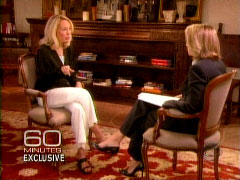 COURIC: Did you ever hear about anything that happened to anyone with whom you had contact as a result of the leak? COURIC: Did you ever hear about anything that happened to anyone with whom you had contact as a result of the leak?
PLAME: Yes, I have, and that's all I can say. Mm-hmm.
COURIC: Was it bad news?
PLAME: That's -- I have heard. I have had some news.
COURIC: Is it safe to say people were put in danger?
PLAME: There was a damage report done by the CIA. I never saw it. I certainly didn't reach out to my old assets and ask them how they're doing, although I would have liked to have.
COURIC: You probably can speculate about the damage, though.
PLAME: Mm-hmm.
COURIC: If you had to write your own damage assessment, knowing what you know, how serious would it be?
PLAME: It would be serious.
SMITH: There were whole sections of the book, the CIA-
COURIC: Redacted. That's right. About 10 percent. And again, Valerie Plame feels this is political payback for criticizing the pre-war intelligence and the buildup to Iraq. She claims there's no classified material that was redacted, but this is a process that books written by CIA agents go through.
SMITH: Routinely, right, right, right. Cannot wait to see this on 60 Minutes.
COURIC: Really?
SMITH: Yeah.
COURIC: Thanks, Harry.
SMITH: Yeah, absolutely. Katie Couric, always a pleasure to see you. You can see Katie's interview with Valerie Plame on 60 Minutes, this Sunday night at 7:00, 6:00 central, right here on CBS.
The MRC's Brad Wilmouth corrected the closed-captioning against the video to create this transcript of the promotion on the October 19 CBS Evening News:
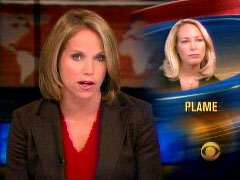 KATIE COURIC: This Sunday on 60 Minutes, Valerie Plame Wilson gives her first interview since top Bush administration officials exposed her role as an undercover CIA agent four years ago. CBS News has learned she was involved in operations to prevent Iran from building a nuclear weapon. In the interview, we talked about what it meant to have her identity revealed.
KATIE COURIC: This Sunday on 60 Minutes, Valerie Plame Wilson gives her first interview since top Bush administration officials exposed her role as an undercover CIA agent four years ago. CBS News has learned she was involved in operations to prevent Iran from building a nuclear weapon. In the interview, we talked about what it meant to have her identity revealed.
COURIC TO PLAME IN 60 MINUTES INTERVIEW: What went through your mind when you saw your name in print?
VALERIE PLAME: Oh, it was horrifying, absolutely horrifying.
COURIC: She served 20 years in the CIA, many undercover in the agency's counterproliferation division, rising to top positions and confronting one of the most ominous threats of our time.
PLAME: Our mission was to make sure that the bad guys, basically, did not get nuclear weapons.
COURIC: When senior administration officials leaked her name to reporters, they may have exposed other spies and damaged operations targeting Iran. CBS News has learned that she was involved in one highly classified mission to deliver fake nuclear weapons blueprints to Tehran. It was called Operation Merlin, and it was first revealed in a book by investigative reporter James Risen.
COURIC TO PLAME: Are you familiar with that?
PLAME: I don't think I can tell you.
COURIC: He said the idea was to give the Iranians blueprints for the bomb that were seriously flawed to set them back. Does that sound like something the counter-proliferation division would do?
PLAME: I think I can say it sounds like a good idea.
COURIC: Were you surprised to read about Operation Merlin in the press?
PLAME: Indeed. Mm-hmm.
COURIC: Is that problematic for the CIA?
PLAME: Leaks are always bad news.
COURIC: She should know, revealing for the first time that the leak of her name had serious repercussions.
PLAME: I can tell you all the intelligence services in the world were running my name through their databases to see did anyone by this name come in the country? When? Do we know anything about it? Where did she stay? Who did she see?
COURIC: And what would be the ramifications of that?
PLAME: Well, it was very serious. It puts in danger, if not shuts down, the operations that I had worked on.
COURIC: Valerie Plame Wilson also has some harsh things to say about President Bush. That and much more in our interview this Sunday on 60 Minutes.
  ABC's Stossel Takes on Gore Movie, Talks ABC's Stossel Takes on Gore Movie, Talks
to Dissenting Scientists
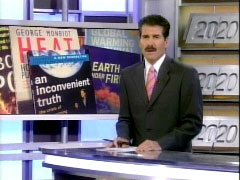 On Friday's 20/20, ABC's John Stossel presented the views of scientists who dissent from the Al Gore view of global warming, including two former members of the IPCC -- the committee which shared the Nobel Peace Prize with Gore. These scientists disagreed with the selection process of the committee's members and some of its conclusions. The ABC host disputed some of the claims in An Inconvenient Truth, and even presented the view that increased carbon dioxide levels are the result of global warming, rather than the cause, as he took on Gore's famous graph from the movie: "But the real inconvenient truth is that carbon increases came after temperature rose -- usually hundreds of years later. Temperature went up first. I wanted to ask Mr. Gore about that and other things, but he wouldn't agree to talk about this."
On Friday's 20/20, ABC's John Stossel presented the views of scientists who dissent from the Al Gore view of global warming, including two former members of the IPCC -- the committee which shared the Nobel Peace Prize with Gore. These scientists disagreed with the selection process of the committee's members and some of its conclusions. The ABC host disputed some of the claims in An Inconvenient Truth, and even presented the view that increased carbon dioxide levels are the result of global warming, rather than the cause, as he took on Gore's famous graph from the movie: "But the real inconvenient truth is that carbon increases came after temperature rose -- usually hundreds of years later. Temperature went up first. I wanted to ask Mr. Gore about that and other things, but he wouldn't agree to talk about this."
[This item, by Brad Wilmouth, was posted Saturday on the MRC's blog, NewsBusters.org: newsbusters.org ]
The ABC host introduced his regular "Give Me a Break" segment: "You've heard the reports. The globe is warming. And it's our fault. And the consequences will be terrible. But you should know there is another side to this story. And scientists who've tried to tell it are often threatened. Which makes me say, 'Give Me a Break.'"
Then came a number of clips of journalists relaying the purported danger of global warming, and clips of children expressing their fears of the future. After arguing that An Inconvenient Truth was incorrect or misleading in the way it presented the dangers of rising sea levels and the plight of polar bears in the Arctic, the ABC host then got to the movie's famous graph that the former Vice President used to argue that higher carbon dioxide levels cause temperatures to increase: "I knew that carbon dioxide's thought to amplify temperature increases, but this shows a clear cause an effect. For 600,000 years, when carbon rose, so did temperature. It suggests that carbon levels control temperature. But the real inconvenient truth is that carbon increases came after temperature rose -- usually hundreds of years later. Temperature went up first. I wanted to ask Mr. Gore about that and other things, but he wouldn't agree to talk about this."
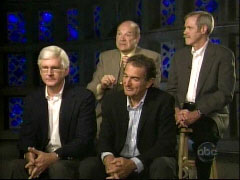 Stossel presented several scientists who dispute contentions by Gore and others that "the debate is over" on global warming. These scientists included Paul Reiter of the Pasteur Institute, Tim Ball of the Natural Resources Stewardship Project, and John Christy and Roy Spencer of the University of Alabama. Stossel relayed their contentions that global warming and cooling trends have happened in the past, and related that the media had "fretted about that then, too." Stossel: "Climate changes, they point out. It always has -- with or without man. Early last century, even without today's big output of carbon dioxide, the Arctic went through a warm period. The media fretted about that then, too. And Greenland's temperatures rose 50 percent faster in the 1920s than they're rising now. Some scientists say the warming may be caused by changes in the sun or ocean currents or changes in cloud cover. Or other things we don't understand. The debate is not over."
Stossel presented several scientists who dispute contentions by Gore and others that "the debate is over" on global warming. These scientists included Paul Reiter of the Pasteur Institute, Tim Ball of the Natural Resources Stewardship Project, and John Christy and Roy Spencer of the University of Alabama. Stossel relayed their contentions that global warming and cooling trends have happened in the past, and related that the media had "fretted about that then, too." Stossel: "Climate changes, they point out. It always has -- with or without man. Early last century, even without today's big output of carbon dioxide, the Arctic went through a warm period. The media fretted about that then, too. And Greenland's temperatures rose 50 percent faster in the 1920s than they're rising now. Some scientists say the warming may be caused by changes in the sun or ocean currents or changes in cloud cover. Or other things we don't understand. The debate is not over."
More on the media's history of reporting on warming and cooling trends over the last century can be found in a May 2005 report by the MRC's Business and Media Institute: www.businessandmedia.org
Reiter and Christy had notably been members of the IPCC, and they were critical of the way governments chose the members of the committee, some of whom were merely activists instead of scientists, suggesting that politics had played too great a role.
STOSSEL: Paul Reiter of the Pasteur Institute and John Christy say they were members of the IPCC. That so-called group of scientists, they say, is not what people think it is.
REITER: The IPCC is the Intergovernmental Panel on Climate Change. It is governments who nominate people. You'll find in many chapters that there are people who are not scientists at all.
STOSSEL: Who are they?
REITER: They were essentially activists.
STOSSEL: Members of groups like Greenpeace were involved. And when the IPCC report came out, not all its members agreed with what was said.
Reiter further said that he had resigned from the committee in protest because he disagreed with some of the report's findings, and had to threaten a lawsuit against the IPCC to have his name removed from the report, although, according to Stossel, the IPCC disputes this account.
Stossel then dealt with the issue of these types of global warming dissenters being "smeared as deniers," as those who support the more liberal view of global warming seek to compare their way of thinking to that of Holocaust deniers.
STOSSEL: Today, scientists like these are often smeared as "deniers."
UNIDENTIFIED MAN: We have Holocaust deniers, we have climate change deniers. And to be honest, I don't think there's a great deal of difference.
LINDA DOUGLAS, ABC News: Deniers are confusing the issue and delaying solutions.
Last August, Newsweek ran a cover story attacking the global warming "denial machine," and the NBC Nightly News soon ran its own story with the same theme. See the August 8 CyberAlert on Newsweek: www.mediaresearch.org
And the August 16 CyberAlert on NBC: www.mediaresearch.org
After recounting that many global warming activists, like Al Gore and Robert F. Kennedy Jr., try to discredit skeptics by accusing them of "being purchased by a 'well-funded denial machine,'" these scientists were shown denying that they receive any money because of their views, as they contended that, rather than being rewarded for their views, they have faced harassment and threats.
Stossel summed up his report: "Is this what the global warming debate has come to? One side saying, 'Shut up, dissent must not be heard'? The truth is that, while everyone agrees the earth has warmed, lots of good scientists don't agree that it's mostly our fault, and don't agree that it's going to be a catastrophe."
Below is a complete transcript of Stossel's "Give Me a Break" segment from the Friday, October 19 20/20:
JOHN STOSSEL: You've heard the reports. The globe is warming. And it's our fault. And the consequences will be terrible. But you should know there is another side to this story. And scientists who've tried to tell it are often threatened. Which makes me say, "Give Me a Break."
MATT LAUER, Today Show: -the world is heating up fast, and we have ourselves to blame.
DAWNA FRIESEN, Today Show: -global warming is real, and we humans are almost certainly the cause.
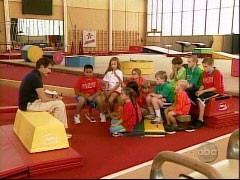 STOSSEL: Books warn that the earth is under fire, a suicidal planet's approaching a boiling point and a toxic burn. Children are frightened. STOSSEL: Books warn that the earth is under fire, a suicidal planet's approaching a boiling point and a toxic burn. Children are frightened.
UNIDENTIFIED GIRL #1: I worry. My mom worries.
UNIDENTIFIED GIRL #2: The water might rise, and it might flood the whole town.
UNIDENTIFIED BOY #1: We won't be able to survive for long.
STOSSEL: And people say since global warming is because of man, it must be fixed by man now.
UNIDENTIFIED MAN in ad, standing in front of a moving train: Some say irreversible consequences are 30 years away.
STOSSEL: This Ad Council PSA says ignoring the coming crisis is like putting our kids in front of a train.
MAN: That won't affect me.
[The man steps off the track and leaves his daughter in front of the moving train.]
STOSSEL: What do you most worry will happen?
UNIDENTIFIED BOY #2: We'll all die.
STOSSEL: Are there some people who say this isn't true?
[Several children who are gathered say, "Yes."]
STOSSEL: Might they be right?
[Nearly all the children gathered say, "No."]
STOSSEL: How do you know they're not right?
UNIDENTIFIED GIRL #3: Well, because the Earth is getting hotter.
STOSSEL: Where do you learn this?
UNIDENTIFIED BOY #1: I saw the Al Gore video.
JERRY SEINFELD, at the Academy Awards: And the Oscar goes to An Inconvenient Truth.
STOSSEL: The global warming documentary featuring Vice President Al Gore has been seen by millions. People have proclaimed him a prophet, a cultural icon, a conquering hero.
LEONARDO DICAPRIO: You are a true champion for the cause, Mr. Gore.
STOSSEL: And last week, he won a Nobel Peace Prize. The Oscars were followed by other worldwide media events.
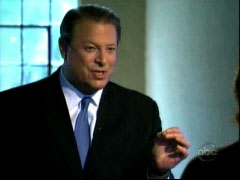 GORE: You are Live Earth. GORE: You are Live Earth.
STOSSEL: With all this hoopla, it's no surprise that 86 percent of Americans say global warming is a serious problem.
JOHN EDWARDS: Global warming is now, by anybody's measure, a crisis.
STOSSEL: But is it a crisis? Yes, the globe is warming, but is it really all our fault? And is it true that the debate is over? No. What you think you know, may not be so. For example, in An Inconvenient Truth, Gore says if we allow the globe to warm, terrible things will happen. And:
AL GORE: Sea level worldwide would go up 20 feet.
UNIDENTIFIED BOY #3: Yeah, maybe like the height of this building.
UNIDENTIFIED GIRL #4: We'll probably just, like, drown, and we'll die.
GORE: This is what would happen to the sea level in Florida. This is what would happen to San Francisco Bay.
STOSSEL: Maybe. Maybe in thousands of years, says the IPCC, the group that shared last week's Nobel Prize with the Vice President. But in 100 years, the oceans might rise 7 to 24 inches, not 20 feet.
GORE: A faster buildup of heat here.
STOSSEL: Mr. Gore also talks about melting ice caps.
GORE: That's not good for creatures like polar bears-
STOSSEL: They show this heart-rending cartoon.
[Cartoon of a polar bear swimming to floating ice and trying to get on, but it breaks leaving the bear in the water.]
GORE: A new scientific study shows that for the first time, they're finding polar bears that have actually drowned.
STOSSEL: But I bet you didn't know that polar bears appear to be doing all right. Future warming may hurt them, but right now, the World Conservation Union and the U.S. Geological Survey say most populations of polar bears are stable or increasing.
GORE: There is one relationship that is far more powerful than all the others-
STOSSEL: The most impressive demonstration in Mr. Gore's movie is the big graph of carbon dioxide levels.
GORE: Here's what the temperature has been on our Earth. Now, one thing that kind of jumps out at you is: Did they ever fit together?
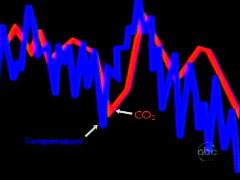 STOSSEL: My goodness! I knew that carbon dioxide's thought to amplify temperature increases, but this shows a clear cause and effect. For 600,000 years, when carbon rose, so did temperature. It suggests that carbon levels control temperature. But the real inconvenient truth is that carbon increases came after temperature rose -- usually hundreds of years later. Temperature went up first. I wanted to ask Mr. Gore about that and other things, but he wouldn't agree to talk about this. Why should he when he and others say- STOSSEL: My goodness! I knew that carbon dioxide's thought to amplify temperature increases, but this shows a clear cause and effect. For 600,000 years, when carbon rose, so did temperature. It suggests that carbon levels control temperature. But the real inconvenient truth is that carbon increases came after temperature rose -- usually hundreds of years later. Temperature went up first. I wanted to ask Mr. Gore about that and other things, but he wouldn't agree to talk about this. Why should he when he and others say-
GORE: The debate's over.
UNIDENTIFIED MAN: The science is agreed upon.
Governor ARNOLD SCHWARZENEGGER (R-CA): The debate is over, and the science is in.
PAUL REITER, Pasteur Institute: It's absurd for people to say that sort of thing. It's really wrong.
STOSSEL: These scientists are among those who say the debate is by no means over. John Christie and Roy Spencer won NASA's Medal for Exceptional Achievement for figuring out how to get temperature data from satellites. They agree that the Earth has warmed.
JOHN CHRISTY, University of Alabama: We all agree that it's warmed, I think. The big question is, and the thing that we dispute, is: Is it because of mankind?
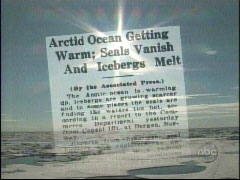 STOSSEL: Climate changes, they point out. It always has -- with or without man. Early last century, even without today's big output of carbon dioxide, the Arctic went through a warm period. The media fretted about that then, too. And Greenland's temperatures rose 50 percent faster in the 1920s than they're rising now. Some scientists say the warming may be caused by changes in the sun or ocean currents or changes in cloud cover. Or other things we don't understand. The debate is not over. And, anyway, who's to say that yesterday's temperature was the perfect one. If temperatures keep rising now, these scientists say we don't know that that will be all bad. STOSSEL: Climate changes, they point out. It always has -- with or without man. Early last century, even without today's big output of carbon dioxide, the Arctic went through a warm period. The media fretted about that then, too. And Greenland's temperatures rose 50 percent faster in the 1920s than they're rising now. Some scientists say the warming may be caused by changes in the sun or ocean currents or changes in cloud cover. Or other things we don't understand. The debate is not over. And, anyway, who's to say that yesterday's temperature was the perfect one. If temperatures keep rising now, these scientists say we don't know that that will be all bad.
TIM BALL, Natural Resources Stewardship Project: The fact is, when the climate changes, there are gains and there are losses.
STOSSEL: But Tim Ball, who studies the history of climate change, points out that all we hear about is the bad news from the IPCC, that massive group of global warming scientists.
RICHARD BRANSON: 2,000 scientists.
LESTER HOLT, NBC News: 2,000 scientists.
FREDRICKA WHITFIELD, CNN: 2,500 scientists say the globe is getting warmer and we are to blame.
REITER: There's the most unmitigated rubbish talked about-
STOSSEL: Paul Reiter of the Pasteur Institute and John Christy say they were members of the IPCC. That so-called group of scientists, they say, is not what people think it is.
REITER: The IPCC is the Intergovernmental Panel on Climate Change. It is governments who nominate people. You'll find in many chapters that there are people who are not scientists at all.
STOSSEL: Who are they?
REITER: They were essentially activists.
STOSSEL: Members of groups like Greenpeace were involved. And when the IPCC report came out, not all its members agreed with what was said.
ROY SPENCER, University of Alabama: We were not asked to look at a particular statement and sign our names to it at all.
REITER: I got very frustrated, and I resigned.
STOSSEL: But the IPCC still listed Reiter as part of the so-called consensus.
REITER: I contacted the IPCC and said, "Look, I've resigned. I don't want to have anything more to do with this." And they said, "Well, you've been involved, so you're still on the list."
STOSSEL: Only when he threatened to sue, he says, did they take his name off the report. The IPCC denies that that happened. Today, scientists like these are often smeared as deniers.
UNIDENTIFIED MAN: We have Holocaust deniers, we have climate change deniers. And to be honest, I don't think there's a great deal of difference.
LINDA DOUGLAS, ABC News: Deniers are confusing the issue and delaying solutions.
STOSSEL: Often they're accused of being purchased by a "well-funded denial machine."
ROBERT F. KENNEDY JR.: These corporate toadies lying to you and telling you that global warming doesn't exist.
GORE: The illusion of a debate has been purchased with millions of dollars a year-
STOSSEL: Aren't you guys all on the take?
BALL: I wish I was. I wouldn't be driving a 1992 car and living in a leaky apartment.
STOSSEL: These scientists all say they don't get any money from business, yet some have been threatened. One email said, "You will not live long enough to see global warming."
BALL: And even more direct than that.
REITER: We stick our necks out. We do get hurt.
STOSSEL: Is this what the global warming debate has come to? One side saying, "Shut up, dissent must not be heard." The truth is that, while everyone agrees the earth has warmed, lots of good scientists don't agree that it's mostly our fault, and don't agree that it's going to be a catastrophe. So when the Nobel Prize winner says-
GORE: The debate's over. The debate's over.
STOSSEL: I say, "Give Me a Break."
  CNN's O'Brien Talks to Gore Critic, Hints CNN's O'Brien Talks to Gore Critic, Hints
Doubters 'In the Dark'
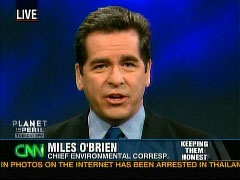 On Friday night, CNN viewers were treated to the special "Keeping Them Honest: The Truth About Global Warming," which took time to examine nine "alleged inconsistencies or exaggerations" in Al Gore's An Inconvenient Truth, as enumerated in a ruling by a British judge. Host Miles O'Brien also interviewed a member of the IPCC, the group which shared the Nobel Peace Prize with Gore, in the form of a scientist who has challenged Gore's views on global warming. O'Brien, who a week earlier had tagged dissenters with such labels as "dead-enders" and "a very small fringe," on this show suggested that people who are "skeptical" about global warming are "in the dark," and presented what he called "surprising" polling data showing a substantial number of Americans have doubts about global warming theory.
On Friday night, CNN viewers were treated to the special "Keeping Them Honest: The Truth About Global Warming," which took time to examine nine "alleged inconsistencies or exaggerations" in Al Gore's An Inconvenient Truth, as enumerated in a ruling by a British judge. Host Miles O'Brien also interviewed a member of the IPCC, the group which shared the Nobel Peace Prize with Gore, in the form of a scientist who has challenged Gore's views on global warming. O'Brien, who a week earlier had tagged dissenters with such labels as "dead-enders" and "a very small fringe," on this show suggested that people who are "skeptical" about global warming are "in the dark," and presented what he called "surprising" polling data showing a substantial number of Americans have doubts about global warming theory.
Notably, beginning at 1:00 p.m. earlier in the day, CNN started displaying its logo in green, and, for a while, used a clock counting down how long it will be until the upcoming series "Planet in Peril" begins on Tuesday October 23. This special two-part series, which is part of CNN's regular "Anderson Cooper 360" series, will examine environmental issues. See: www.cnn.com
[This item, by Brad Wilmouth, was posted Saturday night on the MRC's blog, NewsBusters.org: newsbusters.org ]
On Friday's special, Gore's claim that global warming has had effects on the frequency and intensity of hurricanes and tornadoes was the first of the nine points examined, as O'Brien brought aboard CNN meteorologist Rob Marciano to discuss the subject. A few weeks ago, on CNN's "American Morning," Marciano had notably exclaimed that he was happy to hear about the judge's skeptical view of An Inconvenient Truth, as he commented about the movie's inaccuracies, prompting email complaints from CNN viewers.
On Friday's special, Marciano relayed that there are no studies that show "an increase in tornadoes due to global warming," and contended that there is still debate about hurricanes. He related the theory that hurricane intensity has increased because of a multi-decade cycle, and pointed to difficulties in accurately measuring hurricane intensities worldwide. He also suggested that any effects on hurricanes by global warming would likely be small. But Marciano ended his discussion by suggested that if you "go green," that "everybody wins." Marciano: "As for who's right and who's wrong, we may not know the answer until it's actually happening. Until then, I think most would agree that, if you do your part and you go green, well, everybody wins."
O'Brien soon brought aboard Dr. John Christy of the University of Alabama, a member of the ICPP who was also featured on 20/20 the same night on ABC. Christy took exception with Gore's willingness to "speak with certainty" about an issue as unpredictable as climate change, and suggested the Nobel committee was trying to "influence American elections." He also pointed out the absence of media coverage when a recent study showed that "Antarctic sea ice extent reached its all-time maximum." Christy: "I suppose CNN did not announce two weeks ago when the Antarctic sea ice extent reached its all-time maximum, even though, in the Arctic in the North Pole, it reached its all-time minimum." Christy also contended that even if the world constructed nuclear plants to replace carbon-producing energy sources, that global temperature would only be affected by "one-hundredth of a degree per decade."
About halfway through the show, O'Brien brought aboard political analyst Bill Schneider to discuss poll numbers on the public's views of global warming. O'Brien had earlier plugged the segment by suggesting that those who do not agree with the more liberal view of global warming are "in the dark." O'Brien: "And what do you believe about global warming? See whether Americans are getting greener or whether they're still in the dark. That's coming up."
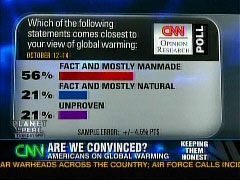 O'Brien began his recitation of the poll results: "This one is a surprise. This is the CNN/Opinion Research Corporation Poll, recent one. 'Which of the following statements comes closest to your view of global warming?' we asked. And here's the response. Global warming is a proven fact, mostly man-made: 56 percent. Global warming is a proven fact, mostly natural: 21 percent. And then, completely unproven: 21 percent. It's interesting when you lump those bottom two together, isn't it?" He thought it "interesting" that so many Americans are in a "skeptical realm" even though "more than 90 percent of scientists would say it is man-made and happening."
O'Brien began his recitation of the poll results: "This one is a surprise. This is the CNN/Opinion Research Corporation Poll, recent one. 'Which of the following statements comes closest to your view of global warming?' we asked. And here's the response. Global warming is a proven fact, mostly man-made: 56 percent. Global warming is a proven fact, mostly natural: 21 percent. And then, completely unproven: 21 percent. It's interesting when you lump those bottom two together, isn't it?" He thought it "interesting" that so many Americans are in a "skeptical realm" even though "more than 90 percent of scientists would say it is man-made and happening."
Regarding the finding that only 35 percent of Americans see global warming as an "immediate threat," Schneider fretted that "our political system can deal with the problems only if people see an immediate crisis," and contended that "it's unlikely much can happen unless people sense a crisis, and the only time they've sensed it is in Hurricane Katrina, and of course then, government did not work."
In a relatively rare acknowledgment, O'Brien brought up the Clinton administration's refusal to push the Kyoto global warming treaty because of its lack of support in the Senate, as he was critiquing the handling of the global warming issue by both the Bush and Clinton administrations. Regarding President Bush, he related that after making a promise during the election to support regulations to reduce carbon emissions, he "cooled to the concept" after taking office, as global warming became a "dead issue." O'Brien contended that "government scientists who disagreed say they were censored or edited so to appear they were towing the line." After relating the Clinton administration's refusal to push the Kyoto treaty, as the issue "languished," the CNN host concluded that portion of the show by warning that "while nothing has been done, the problem has gotten harder to solve." O'Brien: "So if you're looking for the reasons the U.S. has done little to respond to the climate crisis, you can find them on both sides of the aisle. And while nothing has been done, the problem has gotten harder to solve."
O'Brien later interviewed Peter Schwartz of the Monitor Group to discuss the possibility that flooding caused by global warming could cause refugee problems which could threaten world peace, and then the CNN host finished going through the remainder of the nine points against An Inconvenient Truth, which he called "alleged inconsistencies or exaggerations." O'Brien concluded the program by insisting the British judge still endorsed the basics of Gore's movie. O'Brien: "And we should point out at this point we've gone through all nine of those alleged inconsistencies or exaggerations brought out by that British judge in the midst of that lawsuit. But worth pointing out, that the judge said in mentioning those nine inconsistencies that the scientific substance, the facts of the science that form the basis of Gore's movie, are, in fact, correct."
Below is a transcript of some noteworthy portions of the show:
# 8:05 p.m. MILES O'BRIEN: Gore's critics also picked up some powerful ammunition just before the Nobel Committee announced the Peace Prize. A British judge ruled "An Inconvenient Truth," the Oscar-winning film of Gore's global warming lecture, contains nine errors that need to be pointed out to students as the movie is played in British schools. Since we're keeping everyone honest here, we're going to look at all nine points of contention this hour. First, the link between global warming and the weather. In the movie, Gore implies there's a direct link between global warming and the killer hurricane season of 2005, which, of course, included Katrina, as well as a series of devastating tornadoes the year before. Listen to this.
AL GORE, from "An Inconvenient Truth," clip #1: And then what happened? Before it hit New Orleans, it went over warmer waters. As the water temperature increases, the wind velocity increases, and the moisture content increases.
GORE, clip #2: And the same year that we had that string of big hurricanes, we also set an all-time record for tornadoes in the United States.
O'BRIEN: Meteorologist Rob Marciano is in the CNN Weather Center. Rob, let's start on that last point there. Is there any science which shows global warming leads to more severe tornadoes?
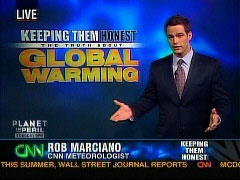 ROB MARCIANO: Miles, there's no study that we know of that shows an increase in tornadoes due to global warming, either now or forecast for the future. Now, on the topic of hurricanes and global warming, that is still up for debate. Storms have increased in the Atlantic since 1995. The question is why and where else? Some hurricane experts say Atlantic hurricanes have increased because of a 20- to 30-year ocean cycle. Some say it's because of global warming. Regardless, Atlantic hurricanes account for less than 15 percent of all tropical cyclones worldwide. So studies have been done to see if storms worldwide have increased. And some studies say yes. Others say the data from outside the Atlantic is not good. Estimating hurricane strength from satellites, well, it's just not precise. And the U.S. is the only country to routinely fly into hurricanes. And that's the only way to actually measure a storm's strength. A recent study conducted by respected scientist Jim Kossin re-analyzes the global data and shows that there has been no increase in hurricane strength worldwide in the last 20 years. The fact is, hurricanes need much more than just warm water to grow, but they do need at least 80-degree water to form. Warm water evaporates. It rises, form clouds, and that releases heat. That heat release then leads to more strengthening of the storm. That leads to more evaporation and the cycle repeats itself. The storm can kind of feed on itself and strengthen. Most hurricane experts agree that, if waters increase by one degree Celsius, hurricane winds will increase by about 5 percent by the end of the century. That means any increase that we have seen in recent hurricanes due to warming would only be about 2 percent, statistically indiscernible. And, of course, it's not as simple as warm water equals strong storm. Some things can kill or at least weaken a hurricane, dry land, for one thing, dry air, and something called wind shear. High-altitude winds typically energize most storms, but they actually weaken hurricanes. And when tropical cyclones ride the trade winds east to west and high-altitude winds are strong, it creates this wind shear. When a hurricane or tropical storm hits wind shear, the top of the storm actually gets choked and torn off. This not only weakens hurricanes, but it also prevents storms from forming in the first place. And a recent study done by the Geophysical Fluid Dynamics Laboratory says global warming may increase wind shear and therefore decrease hurricanes. Now, I'm sure there's going to be more studies down the road, Miles, and no doubt this debate will continue. As for who's right and who's wrong, we may not know the answer until it's actually happening. Until then, I think most would agree that, if you do your part and you go green, well, everybody wins. Miles? ROB MARCIANO: Miles, there's no study that we know of that shows an increase in tornadoes due to global warming, either now or forecast for the future. Now, on the topic of hurricanes and global warming, that is still up for debate. Storms have increased in the Atlantic since 1995. The question is why and where else? Some hurricane experts say Atlantic hurricanes have increased because of a 20- to 30-year ocean cycle. Some say it's because of global warming. Regardless, Atlantic hurricanes account for less than 15 percent of all tropical cyclones worldwide. So studies have been done to see if storms worldwide have increased. And some studies say yes. Others say the data from outside the Atlantic is not good. Estimating hurricane strength from satellites, well, it's just not precise. And the U.S. is the only country to routinely fly into hurricanes. And that's the only way to actually measure a storm's strength. A recent study conducted by respected scientist Jim Kossin re-analyzes the global data and shows that there has been no increase in hurricane strength worldwide in the last 20 years. The fact is, hurricanes need much more than just warm water to grow, but they do need at least 80-degree water to form. Warm water evaporates. It rises, form clouds, and that releases heat. That heat release then leads to more strengthening of the storm. That leads to more evaporation and the cycle repeats itself. The storm can kind of feed on itself and strengthen. Most hurricane experts agree that, if waters increase by one degree Celsius, hurricane winds will increase by about 5 percent by the end of the century. That means any increase that we have seen in recent hurricanes due to warming would only be about 2 percent, statistically indiscernible. And, of course, it's not as simple as warm water equals strong storm. Some things can kill or at least weaken a hurricane, dry land, for one thing, dry air, and something called wind shear. High-altitude winds typically energize most storms, but they actually weaken hurricanes. And when tropical cyclones ride the trade winds east to west and high-altitude winds are strong, it creates this wind shear. When a hurricane or tropical storm hits wind shear, the top of the storm actually gets choked and torn off. This not only weakens hurricanes, but it also prevents storms from forming in the first place. And a recent study done by the Geophysical Fluid Dynamics Laboratory says global warming may increase wind shear and therefore decrease hurricanes. Now, I'm sure there's going to be more studies down the road, Miles, and no doubt this debate will continue. As for who's right and who's wrong, we may not know the answer until it's actually happening. Until then, I think most would agree that, if you do your part and you go green, well, everybody wins. Miles?
O'BRIEN: I guess we're all part of the experiment. Thank you very much, meteorologist Rob Marciano.
...
# 8:15 p.m. O'BRIEN: But many skeptics are quick to point out Gore does not have any scientific credentials. And that's what leads us to a crucial ocean current widely known as the Conveyor belt. What may or may not be happening to it is another bone of contention for those critical of "An Inconvenient Truth."
...
O'BRIEN: No one doubts it can be sudden, but IPCC scientists see no evidence it will happen any time soon.
O'BRIEN: Politics makes for strange bedfellows, of course. Well, so does winning one of the world's most prestigious awards. Up next, I'll speak with a man who shares a slice of this year's Nobel Peace Prize with Al Gore, but doesn't see eye to eye with him at all. And what do you believe about global warming? See whether Americans are getting greener or whether they're still in the dark. That's coming up.
...
O'BRIEN: But I'll tell you who's not laughing, the critics who accuse Gore of being an alarmist, who say global warming is not a catastrophe. One of them is, ironically, one of the scientists who shares a piece of the Nobel Peace Prize with Gore, former NASA scientist John Christy, joining from us Huntsville, Alabama. Dr. Christy, good to have you with us.
Dr. JOHN CHRISTY, University of Alabama: Hello.
O'BRIEN: I assume you're not happy about sharing this award with Al Gore. You going to renounce it in some way?
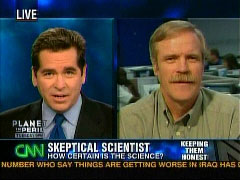 CHRISTY: Well, as a scientist at the University of Alabama in Huntsville, I always thought that, and I may sound like the Grinch who stole Christmas here, that prizes were given for performance, and not for promotional activities. And when I look at the world, I see that the carbon dioxide rate is increasing, and energy demand, of course, is increasing. And that's because, without energy, life is brutal and short. So I don't see very much effect in trying to scare people into not using energy when it is the very basis of how we can live in our society. CHRISTY: Well, as a scientist at the University of Alabama in Huntsville, I always thought that, and I may sound like the Grinch who stole Christmas here, that prizes were given for performance, and not for promotional activities. And when I look at the world, I see that the carbon dioxide rate is increasing, and energy demand, of course, is increasing. And that's because, without energy, life is brutal and short. So I don't see very much effect in trying to scare people into not using energy when it is the very basis of how we can live in our society.
O'BRIEN: So what about the movie do you take issue with, then, Dr. Christy?
CHRISTY: Well, there's any number of things. I suppose, fundamentally, it's the fact that someone is speaking about a science that I've been very heavily involved in and have labored so hard in, and been humiliated by, in the sense that the climate is so difficult to understand, Mother Nature is so complex, and so the uncertainties are great, and then to hear someone speak with such certainty and such confidence about what the climate is going to do is, well, I suppose I could be kind and say, it's annoying to me.
O'BRIEN: But you just got through saying that carbon dioxide levels are up, temperatures are going up. There is a certain degree of certainty that goes along with that, right?
CHRISTY: Well, the carbon dioxide is going up. And remember that carbon dioxide is plant food in the fundamental sense. All of life depends on the fact carbon dioxide is in the atmosphere. So we're fortunate it's not a toxic gas. But, on the other hand, what is the climate doing? And when we build, and I'm one of the few people in the world that actually builds these climate data sets, we don't see the catastrophic changes that are being promoted all over the place. For example, I suppose CNN did not announce two weeks ago when the Antarctic sea ice extent reached its all-time maximum, even though, in the Arctic in the North Pole, it reached its all-time minimum.
O'BRIEN: Let's talk about the critics in general. Many of the critics we hear from have links to the fossil fuel industry. A lot of their funding comes from the coal and oil industries. How about you?
CHRISTY: All of my funding is federal and state grants. And I apply for them and write my papers, which are peer-reviewed. So I have disengaged and never was really involved in any of that.
O'BRIEN: Does it make you angry that Al Gore got the Peace Prize?
CHRISTY: No, I think it's just a commentary on a prize that is a political prize. I think it was clearly designed to influence American elections and so on. But, in a sense, you can't begrudge someone who has become a star. I mean, he has really attracted the media attention and so on. So that's just what happens in the world of politics.
O'BRIEN: So you say this is a political award then?
CHRISTY: Well, as I said at the very beginning, I don't see any accomplishment here. I don't see CO2 going down because of the campaign, the crusade that he's on. And I only see it going up, because, and I come back to this, energy is absolutely vital for human society, and its use will increase. There's a tremendous amount of pent-up energy demand, especially in the Third World right now. So we shall see it rise.
O'BRIEN: But some would say it's time to look at alternatives that don't put that CO2 into the atmosphere.
CHRISTY: Well, I've done the work on that, and the only alternative that can make a tiny dent in the rate of temperature increase, if it is increasing at a high rate, is nuclear power. So if you built 1,000 nuclear power plants right now, you would be able to affect the global temperature by, listen to this, one-hundredth of a degree per decade. I don't know if that's the price we want to pay, but nuclear power, in democratically accountable countries, is fairly safe and useful that way.
O'BRIEN: John Christy, thank you for your time.
CHRISTY: My pleasure.
...
O'BRIEN: The scientists who share the Peace Prize with Gore say evidence the climate system is warming is unequivocal, and it's everywhere -- increased air and ocean temperatures, rising sea levels, and melting snow and ice. And check out this chart. Based on information gleaned from Antarctic ice core samples, it shows carbon dioxide and temperature levels on Earth over the past 650,000 years.
GORE, in An Inconvenient Truth: Look how far above the natural cycle this is, and we've done that.
O'BRIEN: There really isn't anyone who denies these numbers. As Gore puts it:
GORE: The so-called skeptics look at this and they say, "So? That seems perfectly okay."
O'BRIEN: And some skeptics suggest the graph on its own does not prove a link between human production of greenhouse gases and global warming. True, perhaps, but it is only one graph, one compelling piece of circumstantial evidence.
...
# 8:33 p.m. O'BRIEN: We're looking at global warming, just the facts, and we're keeping them all honest as we look at Al Gore, his movie and those who say he didn't let the facts get in the way of a good story.
So what does the evidence show about what you think? Al Gore may be winning all kinds of awards, but a lot of Americans are not buying what he is selling. For some insights into some surprising numbers, we turn to our senior political analyst, Bill Schneider. Bill, good to have you with us here.
WILLIAM SCHNEIDER: Sure.
O'BRIEN: Let's look at the numbers, first of all. This one is a surprise. This is the CNN/Opinion Research Corporation Poll, recent one. "Which of the following statements comes closest to your view of global warming?" we asked. And here's the response. Global warming is a proven fact, mostly man-made: 56 percent. Global warming is a proven fact, mostly natural: 21 percent. And then, completely unproven: 21 percent. It's interesting when you lump those bottom two together, isn't it?
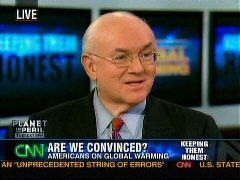 SCHNEIDER: Well, yeah, because it says only 56 percent. The top two, the top answer, rather, agree with the overwhelming scientific consensus that global warming is not just a fact but it's caused by people. If you don't think it's caused by people, then you probably don't think there's much people can do about it. Like the weather. Everybody talks about it; nobody does anything about it. SCHNEIDER: Well, yeah, because it says only 56 percent. The top two, the top answer, rather, agree with the overwhelming scientific consensus that global warming is not just a fact but it's caused by people. If you don't think it's caused by people, then you probably don't think there's much people can do about it. Like the weather. Everybody talks about it; nobody does anything about it.
O'BRIEN: It's interesting because more than 90 percent of the scientists would say it is man-made and happening. And about 40 percent of Americans are still in the skeptical realm.
SCHNEIDER: That's right. They are still skeptical of that argument.
O'BRIEN: All right. Next, this is also from the same poll, CNN/Opinion Research Poll. Question, first question. "Is global warming a threat to the world?" 72 percent of you say yes, 27 percent no, but this is the interesting one to follow up on here.
SCHNEIDER: Right.
O'BRIEN: The question then was: "Is it an immediate threat, an eventual threat, or not a threat?" And look at how the numbers went there. That's interesting, isn't it?
SCHNEIDER: Yes, because only 35 percent, just over a third, consider global warming an immediate threat. That's significant because our political system can deal with the problems only if people see an immediate crisis. That's the way it was designed. It was designed for weak government. If there's no overwhelming sense of public urgency, there's too many ways to block things from happening. So it's unlikely much can happen unless people sense a crisis, and the only time they've sensed it is in Hurricane Katrina, and of course then, government did not work.
O'BRIEN: We work best when our back is against the wall.
SCHNEIDER: Exactly.
O'BRIEN: All right, listen to this. This final one is interesting. This is from a different poll organization. This is from Pew Global Attitudes, their project there. And the question, they gave people a list of worries, potential worries, and asked people if environmental problems were at the top of their list. And based on the answer, 70 percent in China say yes. All the way at the bottom is the U.S. at 37 percent. How do you explain that one?
SCHNEIDER: Well, Americans see other things as bigger problems because, of course, we're the only global superpower today. What other things did they pick higher than the environment? They pick the spread of nuclear weapons. They pick religious and ethnic hatred. Russians and Chinese worry a lot about the growing income gap between rich and poor in their fast-growing economies. People in developing countries often pick AIDS and the spread of infectious diseases as a top threat. And interestingly, people in Japan gave very high priority to the spread of nuclear weapons, and I can think of a reason why.
O'BRIEN: Yeah, for sure. Sounds like people generally think locally, not globally, right?
SCHNEIDER: Exactly right. They think locally and they think about immediate crisis.
O'BRIEN: All right. Bill Schneider, thank you very much for sorting through these numbers with us. We appreciate it.
...
# 8:36 p.m. O'BRIEN: What about Al Gore's record when he was in the White House? Now, you would think he and Bill Clinton would have done a lot to curb global warming. Well, think again. There was a brief moment in time when Al Gore and George Bush actually agreed on global warming. When they were running for the Oval Office in 2000, they were asked in a debate if they would promise to limit U.S. greenhouse gas emissions.
GEORGE W. BUSH: Global warming needs to be taken very seriously, and I take it seriously.
O'BRIEN: But that didn't last long. Once Bush became President, his administration cooled to the concept, if you will. Vice President Cheney told CNN's John King that Bush's campaign promise to cap greenhouse emissions would hurt the U.S. economy.
DICK CHENEY: It was a mistake because we aren't in a position today to be able to do that in terms of sort of capping emissions, CO2 emissions.
O'BRIEN: And that was that. In the Bush White House, global warming became a dead issue. Government scientists who disagreed say they were censored or edited so to appear they were towing the line. The administration flatly rejected the Kyoto treaty, which holds industrialized nations to limits on greenhouse gas production. But Kyoto was an orphan before Bush left it on the world's doorstep. It languished during the Clinton/Gore years as well, even with the issue's best-known global activist a heartbeat away.
BILL CLINTON: We need a climate change on Capitol Hill on this issue, and it should not be a partisan issue.
O'BRIEN: Political considerations hindered both administrations.
DAVID HAMILTON, Sierra Club: I would say that the Bush administration has a "D" and that the Clinton administration probably got a "C plus." Either way, not very good grades. We're very far behind the curve on where we need to be on controlling global warming both in the process and the politics.
O'BRIEN: Last year, Gore told Larry King he urged Clinton to push for ratification of the treaty.
AL GORE: I have to say that it was perfectly reasonable for him to say, look, our congressional relations people tell us there is no support for it there, and I personally tried. I could only convince one senator out of all 100 to say that he or she would definitely vote to ratify.
O'BRIEN: The Senate voted 95 to nothing not to accept Kyoto's caps, and Bush has remained steadfastly opposed to mandatory regulation, insisting voluntary measures and high technology are the solution.
BUSH: These technologies will help us be better stewards of the environment. And they will help us to confront the serious challenge of global climate change.
O'BRIEN: So if you're looking for the reasons the U.S. has done little to respond to the climate crisis, you can find them on both sides of the aisle. And while nothing has been done, the problem has gotten harder to solve.
...
# 8:41 p.m. O'BRIEN: Throughout this hour, we're bringing out the points of contention with Al Gore's "Inconvenient Truth." On to number seven now. The polar bears, as you well now, have become an icon of global warming, and they are literally on thin ice, but could they actually be drowning? That's what Gore says in the movie.
GORE: A new scientific study shows that, for the first time, they're finding polar bears that have actually drowned swimming long distances up to 60 miles to find the ice. And they didn't find that before.
O'BRIEN: Critics, including that British judge we've been telling you about, say there is no proof polar bears have died because of global warming. The scientific study in question says four bears died after swimming in open water in Hudson Bay through a storm. Was it the storm that killed them, as skeptics suggest, or was it climate change? Well, we do know this. They wouldn't have drowned if they were on the ice, and there is no doubt the ice there is steadily retreating, especially in places like Hudson Bay.
...
# 8:55 p.m. O'BRIEN: And we should point out at this point we've gone through all nine of those alleged inconsistencies or exaggerations brought out by that British judge in the midst of that lawsuit. But worth pointing out, that the judge said in mentioning those nine inconsistencies that the scientific substance, the facts of the science that form the basis of Gore's movie, are, in fact, correct.
  11-Year-Old Kid on CBS Reality Show: 11-Year-Old Kid on CBS Reality Show:
Bush 'Not Smart at All'
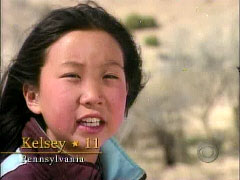 No where on CBS is a safe zone from some gratuitous Bush-bashing, not even the Kid Nation reality show, the MRC's Kristine Lawrence noticed. For last Wednesday's episode of the show premised on kids establishing and running a community at a New Mexico ghost town, dubbed "Bonanza City," four sets of kids had to assemble in chronological order photographs of seven U.S. Presidents. The yellow team won, mainly because of team member Zach, ten-year-old. His fellow teammate, 11-year-old-Kelsey from Pennsylvania, seemed to resent his success as the program featured this comment from her: "We won with the help of Zach, but just because he knows his Presidents doesn't mean he's the best leader. I mean, look at George W. Bush. He's not smart at all but he won the U.S. President two times in a row."
No where on CBS is a safe zone from some gratuitous Bush-bashing, not even the Kid Nation reality show, the MRC's Kristine Lawrence noticed. For last Wednesday's episode of the show premised on kids establishing and running a community at a New Mexico ghost town, dubbed "Bonanza City," four sets of kids had to assemble in chronological order photographs of seven U.S. Presidents. The yellow team won, mainly because of team member Zach, ten-year-old. His fellow teammate, 11-year-old-Kelsey from Pennsylvania, seemed to resent his success as the program featured this comment from her: "We won with the help of Zach, but just because he knows his Presidents doesn't mean he's the best leader. I mean, look at George W. Bush. He's not smart at all but he won the U.S. President two times in a row."
CBS's Web site for the show includes a questionnaire completed by each contestant. Asked to name the worst President in U.S. history, Kelsey replied: "In my personal opinion, one of the worst U.S Presidents could be George W. Bush because he has the craziest ideas for the country that could lead us into danger. For example, he started the unnecessary war with the country of Iraq which killed many U.S. soldiers." See: www.cbs.com
CBS's page for the 8pm EDT/PDT Wednesday night show: www.cbs.com
  Late Show Contest's 'Top Ten Cool Things Late Show Contest's 'Top Ten Cool Things
About Global Warming'
From the Late Show's "Top Ten Contest" winning entries posted on Saturday, October 20, the "Top Ten Cool Things About Global Warming." Late Show home page: www.cbs.com
10. "Mild" hot sauce now labeled as "Medium" (Ray W, Rockford, IL)
9. New iPod has built-in Slushie machine (Kathleen M, Philadelphia, PA)
8. Baghdad water park now burqa free! (Tom T, Batavia, IL)
7. Amusing news stories about idiots who break their legs diving into evaporated swimming pools (Mike S, Orlando, FL)
6. David Hasselhoff eats only ice cream off the floor (Mark M, Dunnellon, FL)
5. Chances are, Matthew McConaughey may never need to put his shirt back on (Susan B, Las Vegas, NV)
4. New Jersey smells better under water (Doug P, Le Roy, NY)
3. Your $8 cup of Starbucks coffee will stay warm for a month (Jim S, Pittsburgh, PA)
2. Letterman studio audience expected to thaw by 2050 (Mark S, Santa Monica, CA)
1. When Paris Hilton says, "That's hot," she'll sound smart (Mike H, Mount Tabor, NJ)
-- Brent Baker

Home | News Division
| Bozell Columns | CyberAlerts
Media Reality Check | Notable Quotables | Contact
the MRC | Subscribe
|






















 Katie Couric's Sunday 60 Minutes interview, to promote Valerie Plame's new book, Fair Game: My Life as a Spy, My Betrayal by the White House, framed the story just as the media have all along -- Painting Plame as a heroic victim of an orchestrated "smear" with little consideration to who actually gave her name to Bob Novak or the responsibility and motivation of her husband who picked a high-profile political fight with the White House. In a preview on Friday's Early Show, Harry Smith asserted Plame's "life story reads like a spy novel," gushing that "she is beautiful, smart, a covert agent." Smith recalled how "Robert Novak revealed her identify as an undercover CIA agent in his syndicated column" and that "speculation was rampant that the leaking of her name, which is a crime, came from inside the Bush administration, in retaliation for her husband's column." Whether it is a "crime" is far from settled, but without ever pointing out how Novak got the name from Deputy Secretary of State Richard Armitage, a political enemy of Dick Cheney and Karl Rove who opposed the Iraq war, Smith noted that "no one was ever charged with knowingly leaking Valerie Plame's name."
Katie Couric's Sunday 60 Minutes interview, to promote Valerie Plame's new book, Fair Game: My Life as a Spy, My Betrayal by the White House, framed the story just as the media have all along -- Painting Plame as a heroic victim of an orchestrated "smear" with little consideration to who actually gave her name to Bob Novak or the responsibility and motivation of her husband who picked a high-profile political fight with the White House. In a preview on Friday's Early Show, Harry Smith asserted Plame's "life story reads like a spy novel," gushing that "she is beautiful, smart, a covert agent." Smith recalled how "Robert Novak revealed her identify as an undercover CIA agent in his syndicated column" and that "speculation was rampant that the leaking of her name, which is a crime, came from inside the Bush administration, in retaliation for her husband's column." Whether it is a "crime" is far from settled, but without ever pointing out how Novak got the name from Deputy Secretary of State Richard Armitage, a political enemy of Dick Cheney and Karl Rove who opposed the Iraq war, Smith noted that "no one was ever charged with knowingly leaking Valerie Plame's name."  COURIC: An investigation was launched. But as it dragged on, the Wilsons hardly kept a low profile, appearing at glamorous public events, political fundraisers for the Democratic party, and in Vanity Fair magazine.
COURIC: An investigation was launched. But as it dragged on, the Wilsons hardly kept a low profile, appearing at glamorous public events, political fundraisers for the Democratic party, and in Vanity Fair magazine.  A Wednesday [March 7] Washington Post editorial, "The Libby Verdict: The serious consequences of a pointless Washington scandal," certainly didn't match the angle of the rest of the media's coverage of the Libby conviction. Far from treating Joe Wilson as a truth-telling hero, the March 7 Washington Post editorial declared: "Mr. Wilson's case has besmirched nearly everyone it touched. The former ambassador will be remembered as a blowhard." The Post castigated Libby for "lying under oath," yet explained that while "Wilson was embraced by many because he was early in publicly charging that the Bush administration had 'twisted,' if not invented, facts in making the case for war against Iraq....a bipartisan investigation by the Senate intelligence committee subsequently established that all of these claims were false -- and that Mr. Wilson was recommended for the Niger trip by Ms. Plame, his wife."
A Wednesday [March 7] Washington Post editorial, "The Libby Verdict: The serious consequences of a pointless Washington scandal," certainly didn't match the angle of the rest of the media's coverage of the Libby conviction. Far from treating Joe Wilson as a truth-telling hero, the March 7 Washington Post editorial declared: "Mr. Wilson's case has besmirched nearly everyone it touched. The former ambassador will be remembered as a blowhard." The Post castigated Libby for "lying under oath," yet explained that while "Wilson was embraced by many because he was early in publicly charging that the Bush administration had 'twisted,' if not invented, facts in making the case for war against Iraq....a bipartisan investigation by the Senate intelligence committee subsequently established that all of these claims were false -- and that Mr. Wilson was recommended for the Niger trip by Ms. Plame, his wife."  SMITH TO COURIC: This interview, everybody in the world has wanted this interview. This is the interview. First off, what was she like?
SMITH TO COURIC: This interview, everybody in the world has wanted this interview. This is the interview. First off, what was she like?  COURIC: Did you ever hear about anything that happened to anyone with whom you had contact as a result of the leak?
COURIC: Did you ever hear about anything that happened to anyone with whom you had contact as a result of the leak?  KATIE COURIC: This Sunday on 60 Minutes, Valerie Plame Wilson gives her first interview since top Bush administration officials exposed her role as an undercover CIA agent four years ago. CBS News has learned she was involved in operations to prevent Iran from building a nuclear weapon. In the interview, we talked about what it meant to have her identity revealed.
KATIE COURIC: This Sunday on 60 Minutes, Valerie Plame Wilson gives her first interview since top Bush administration officials exposed her role as an undercover CIA agent four years ago. CBS News has learned she was involved in operations to prevent Iran from building a nuclear weapon. In the interview, we talked about what it meant to have her identity revealed. 
 On Friday's 20/20, ABC's John Stossel presented the views of scientists who dissent from the Al Gore view of global warming, including two former members of the IPCC -- the committee which shared the Nobel Peace Prize with Gore. These scientists disagreed with the selection process of the committee's members and some of its conclusions. The ABC host disputed some of the claims in An Inconvenient Truth, and even presented the view that increased carbon dioxide levels are the result of global warming, rather than the cause, as he took on Gore's famous graph from the movie: "But the real inconvenient truth is that carbon increases came after temperature rose -- usually hundreds of years later. Temperature went up first. I wanted to ask Mr. Gore about that and other things, but he wouldn't agree to talk about this."
On Friday's 20/20, ABC's John Stossel presented the views of scientists who dissent from the Al Gore view of global warming, including two former members of the IPCC -- the committee which shared the Nobel Peace Prize with Gore. These scientists disagreed with the selection process of the committee's members and some of its conclusions. The ABC host disputed some of the claims in An Inconvenient Truth, and even presented the view that increased carbon dioxide levels are the result of global warming, rather than the cause, as he took on Gore's famous graph from the movie: "But the real inconvenient truth is that carbon increases came after temperature rose -- usually hundreds of years later. Temperature went up first. I wanted to ask Mr. Gore about that and other things, but he wouldn't agree to talk about this."  Stossel presented several scientists who dispute contentions by Gore and others that "the debate is over" on global warming. These scientists included Paul Reiter of the Pasteur Institute, Tim Ball of the Natural Resources Stewardship Project, and John Christy and Roy Spencer of the University of Alabama. Stossel relayed their contentions that global warming and cooling trends have happened in the past, and related that the media had "fretted about that then, too." Stossel: "Climate changes, they point out. It always has -- with or without man. Early last century, even without today's big output of carbon dioxide, the Arctic went through a warm period. The media fretted about that then, too. And Greenland's temperatures rose 50 percent faster in the 1920s than they're rising now. Some scientists say the warming may be caused by changes in the sun or ocean currents or changes in cloud cover. Or other things we don't understand. The debate is not over."
Stossel presented several scientists who dispute contentions by Gore and others that "the debate is over" on global warming. These scientists included Paul Reiter of the Pasteur Institute, Tim Ball of the Natural Resources Stewardship Project, and John Christy and Roy Spencer of the University of Alabama. Stossel relayed their contentions that global warming and cooling trends have happened in the past, and related that the media had "fretted about that then, too." Stossel: "Climate changes, they point out. It always has -- with or without man. Early last century, even without today's big output of carbon dioxide, the Arctic went through a warm period. The media fretted about that then, too. And Greenland's temperatures rose 50 percent faster in the 1920s than they're rising now. Some scientists say the warming may be caused by changes in the sun or ocean currents or changes in cloud cover. Or other things we don't understand. The debate is not over."  STOSSEL: Books warn that the earth is under fire, a suicidal planet's approaching a boiling point and a toxic burn. Children are frightened.
STOSSEL: Books warn that the earth is under fire, a suicidal planet's approaching a boiling point and a toxic burn. Children are frightened.  GORE: You are Live Earth.
GORE: You are Live Earth.  STOSSEL: My goodness! I knew that carbon dioxide's thought to amplify temperature increases, but this shows a clear cause and effect. For 600,000 years, when carbon rose, so did temperature. It suggests that carbon levels control temperature. But the real inconvenient truth is that carbon increases came after temperature rose -- usually hundreds of years later. Temperature went up first. I wanted to ask Mr. Gore about that and other things, but he wouldn't agree to talk about this. Why should he when he and others say-
STOSSEL: My goodness! I knew that carbon dioxide's thought to amplify temperature increases, but this shows a clear cause and effect. For 600,000 years, when carbon rose, so did temperature. It suggests that carbon levels control temperature. But the real inconvenient truth is that carbon increases came after temperature rose -- usually hundreds of years later. Temperature went up first. I wanted to ask Mr. Gore about that and other things, but he wouldn't agree to talk about this. Why should he when he and others say-  STOSSEL: Climate changes, they point out. It always has -- with or without man. Early last century, even without today's big output of carbon dioxide, the Arctic went through a warm period. The media fretted about that then, too. And Greenland's temperatures rose 50 percent faster in the 1920s than they're rising now. Some scientists say the warming may be caused by changes in the sun or ocean currents or changes in cloud cover. Or other things we don't understand. The debate is not over. And, anyway, who's to say that yesterday's temperature was the perfect one. If temperatures keep rising now, these scientists say we don't know that that will be all bad.
STOSSEL: Climate changes, they point out. It always has -- with or without man. Early last century, even without today's big output of carbon dioxide, the Arctic went through a warm period. The media fretted about that then, too. And Greenland's temperatures rose 50 percent faster in the 1920s than they're rising now. Some scientists say the warming may be caused by changes in the sun or ocean currents or changes in cloud cover. Or other things we don't understand. The debate is not over. And, anyway, who's to say that yesterday's temperature was the perfect one. If temperatures keep rising now, these scientists say we don't know that that will be all bad. 
 On Friday night, CNN viewers were treated to the special "Keeping Them Honest: The Truth About Global Warming," which took time to examine nine "alleged inconsistencies or exaggerations" in Al Gore's An Inconvenient Truth, as enumerated in a ruling by a British judge. Host Miles O'Brien also interviewed a member of the IPCC, the group which shared the Nobel Peace Prize with Gore, in the form of a scientist who has challenged Gore's views on global warming. O'Brien, who a week earlier had tagged dissenters with such labels as "dead-enders" and "a very small fringe," on this show suggested that people who are "skeptical" about global warming are "in the dark," and presented what he called "surprising" polling data showing a substantial number of Americans have doubts about global warming theory.
On Friday night, CNN viewers were treated to the special "Keeping Them Honest: The Truth About Global Warming," which took time to examine nine "alleged inconsistencies or exaggerations" in Al Gore's An Inconvenient Truth, as enumerated in a ruling by a British judge. Host Miles O'Brien also interviewed a member of the IPCC, the group which shared the Nobel Peace Prize with Gore, in the form of a scientist who has challenged Gore's views on global warming. O'Brien, who a week earlier had tagged dissenters with such labels as "dead-enders" and "a very small fringe," on this show suggested that people who are "skeptical" about global warming are "in the dark," and presented what he called "surprising" polling data showing a substantial number of Americans have doubts about global warming theory.  O'Brien began his recitation of the poll results: "This one is a surprise. This is the CNN/Opinion Research Corporation Poll, recent one. 'Which of the following statements comes closest to your view of global warming?' we asked. And here's the response. Global warming is a proven fact, mostly man-made: 56 percent. Global warming is a proven fact, mostly natural: 21 percent. And then, completely unproven: 21 percent. It's interesting when you lump those bottom two together, isn't it?" He thought it "interesting" that so many Americans are in a "skeptical realm" even though "more than 90 percent of scientists would say it is man-made and happening."
O'Brien began his recitation of the poll results: "This one is a surprise. This is the CNN/Opinion Research Corporation Poll, recent one. 'Which of the following statements comes closest to your view of global warming?' we asked. And here's the response. Global warming is a proven fact, mostly man-made: 56 percent. Global warming is a proven fact, mostly natural: 21 percent. And then, completely unproven: 21 percent. It's interesting when you lump those bottom two together, isn't it?" He thought it "interesting" that so many Americans are in a "skeptical realm" even though "more than 90 percent of scientists would say it is man-made and happening."  ROB MARCIANO: Miles, there's no study that we know of that shows an increase in tornadoes due to global warming, either now or forecast for the future. Now, on the topic of hurricanes and global warming, that is still up for debate. Storms have increased in the Atlantic since 1995. The question is why and where else? Some hurricane experts say Atlantic hurricanes have increased because of a 20- to 30-year ocean cycle. Some say it's because of global warming. Regardless, Atlantic hurricanes account for less than 15 percent of all tropical cyclones worldwide. So studies have been done to see if storms worldwide have increased. And some studies say yes. Others say the data from outside the Atlantic is not good. Estimating hurricane strength from satellites, well, it's just not precise. And the U.S. is the only country to routinely fly into hurricanes. And that's the only way to actually measure a storm's strength. A recent study conducted by respected scientist Jim Kossin re-analyzes the global data and shows that there has been no increase in hurricane strength worldwide in the last 20 years. The fact is, hurricanes need much more than just warm water to grow, but they do need at least 80-degree water to form. Warm water evaporates. It rises, form clouds, and that releases heat. That heat release then leads to more strengthening of the storm. That leads to more evaporation and the cycle repeats itself. The storm can kind of feed on itself and strengthen. Most hurricane experts agree that, if waters increase by one degree Celsius, hurricane winds will increase by about 5 percent by the end of the century. That means any increase that we have seen in recent hurricanes due to warming would only be about 2 percent, statistically indiscernible. And, of course, it's not as simple as warm water equals strong storm. Some things can kill or at least weaken a hurricane, dry land, for one thing, dry air, and something called wind shear. High-altitude winds typically energize most storms, but they actually weaken hurricanes. And when tropical cyclones ride the trade winds east to west and high-altitude winds are strong, it creates this wind shear. When a hurricane or tropical storm hits wind shear, the top of the storm actually gets choked and torn off. This not only weakens hurricanes, but it also prevents storms from forming in the first place. And a recent study done by the Geophysical Fluid Dynamics Laboratory says global warming may increase wind shear and therefore decrease hurricanes. Now, I'm sure there's going to be more studies down the road, Miles, and no doubt this debate will continue. As for who's right and who's wrong, we may not know the answer until it's actually happening. Until then, I think most would agree that, if you do your part and you go green, well, everybody wins. Miles?
ROB MARCIANO: Miles, there's no study that we know of that shows an increase in tornadoes due to global warming, either now or forecast for the future. Now, on the topic of hurricanes and global warming, that is still up for debate. Storms have increased in the Atlantic since 1995. The question is why and where else? Some hurricane experts say Atlantic hurricanes have increased because of a 20- to 30-year ocean cycle. Some say it's because of global warming. Regardless, Atlantic hurricanes account for less than 15 percent of all tropical cyclones worldwide. So studies have been done to see if storms worldwide have increased. And some studies say yes. Others say the data from outside the Atlantic is not good. Estimating hurricane strength from satellites, well, it's just not precise. And the U.S. is the only country to routinely fly into hurricanes. And that's the only way to actually measure a storm's strength. A recent study conducted by respected scientist Jim Kossin re-analyzes the global data and shows that there has been no increase in hurricane strength worldwide in the last 20 years. The fact is, hurricanes need much more than just warm water to grow, but they do need at least 80-degree water to form. Warm water evaporates. It rises, form clouds, and that releases heat. That heat release then leads to more strengthening of the storm. That leads to more evaporation and the cycle repeats itself. The storm can kind of feed on itself and strengthen. Most hurricane experts agree that, if waters increase by one degree Celsius, hurricane winds will increase by about 5 percent by the end of the century. That means any increase that we have seen in recent hurricanes due to warming would only be about 2 percent, statistically indiscernible. And, of course, it's not as simple as warm water equals strong storm. Some things can kill or at least weaken a hurricane, dry land, for one thing, dry air, and something called wind shear. High-altitude winds typically energize most storms, but they actually weaken hurricanes. And when tropical cyclones ride the trade winds east to west and high-altitude winds are strong, it creates this wind shear. When a hurricane or tropical storm hits wind shear, the top of the storm actually gets choked and torn off. This not only weakens hurricanes, but it also prevents storms from forming in the first place. And a recent study done by the Geophysical Fluid Dynamics Laboratory says global warming may increase wind shear and therefore decrease hurricanes. Now, I'm sure there's going to be more studies down the road, Miles, and no doubt this debate will continue. As for who's right and who's wrong, we may not know the answer until it's actually happening. Until then, I think most would agree that, if you do your part and you go green, well, everybody wins. Miles?  CHRISTY: Well, as a scientist at the University of Alabama in Huntsville, I always thought that, and I may sound like the Grinch who stole Christmas here, that prizes were given for performance, and not for promotional activities. And when I look at the world, I see that the carbon dioxide rate is increasing, and energy demand, of course, is increasing. And that's because, without energy, life is brutal and short. So I don't see very much effect in trying to scare people into not using energy when it is the very basis of how we can live in our society.
CHRISTY: Well, as a scientist at the University of Alabama in Huntsville, I always thought that, and I may sound like the Grinch who stole Christmas here, that prizes were given for performance, and not for promotional activities. And when I look at the world, I see that the carbon dioxide rate is increasing, and energy demand, of course, is increasing. And that's because, without energy, life is brutal and short. So I don't see very much effect in trying to scare people into not using energy when it is the very basis of how we can live in our society.  SCHNEIDER: Well, yeah, because it says only 56 percent. The top two, the top answer, rather, agree with the overwhelming scientific consensus that global warming is not just a fact but it's caused by people. If you don't think it's caused by people, then you probably don't think there's much people can do about it. Like the weather. Everybody talks about it; nobody does anything about it.
SCHNEIDER: Well, yeah, because it says only 56 percent. The top two, the top answer, rather, agree with the overwhelming scientific consensus that global warming is not just a fact but it's caused by people. If you don't think it's caused by people, then you probably don't think there's much people can do about it. Like the weather. Everybody talks about it; nobody does anything about it. 
 No where on CBS is a safe zone from some gratuitous Bush-bashing, not even the Kid Nation reality show, the MRC's Kristine Lawrence noticed. For last Wednesday's episode of the show premised on kids establishing and running a community at a New Mexico ghost town, dubbed "Bonanza City," four sets of kids had to assemble in chronological order photographs of seven U.S. Presidents. The yellow team won, mainly because of team member Zach, ten-year-old. His fellow teammate, 11-year-old-Kelsey from Pennsylvania, seemed to resent his success as the program featured this comment from her: "We won with the help of Zach, but just because he knows his Presidents doesn't mean he's the best leader. I mean, look at George W. Bush. He's not smart at all but he won the U.S. President two times in a row."
No where on CBS is a safe zone from some gratuitous Bush-bashing, not even the Kid Nation reality show, the MRC's Kristine Lawrence noticed. For last Wednesday's episode of the show premised on kids establishing and running a community at a New Mexico ghost town, dubbed "Bonanza City," four sets of kids had to assemble in chronological order photographs of seven U.S. Presidents. The yellow team won, mainly because of team member Zach, ten-year-old. His fellow teammate, 11-year-old-Kelsey from Pennsylvania, seemed to resent his success as the program featured this comment from her: "We won with the help of Zach, but just because he knows his Presidents doesn't mean he's the best leader. I mean, look at George W. Bush. He's not smart at all but he won the U.S. President two times in a row." 